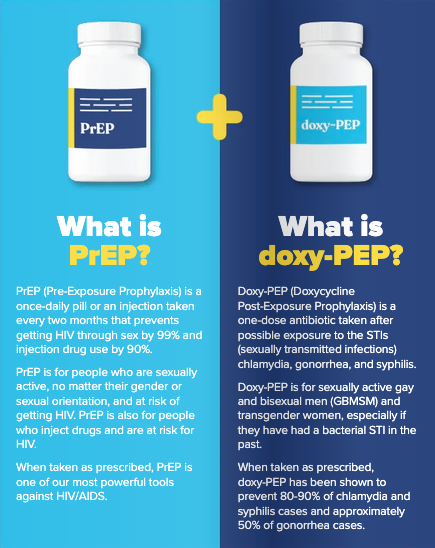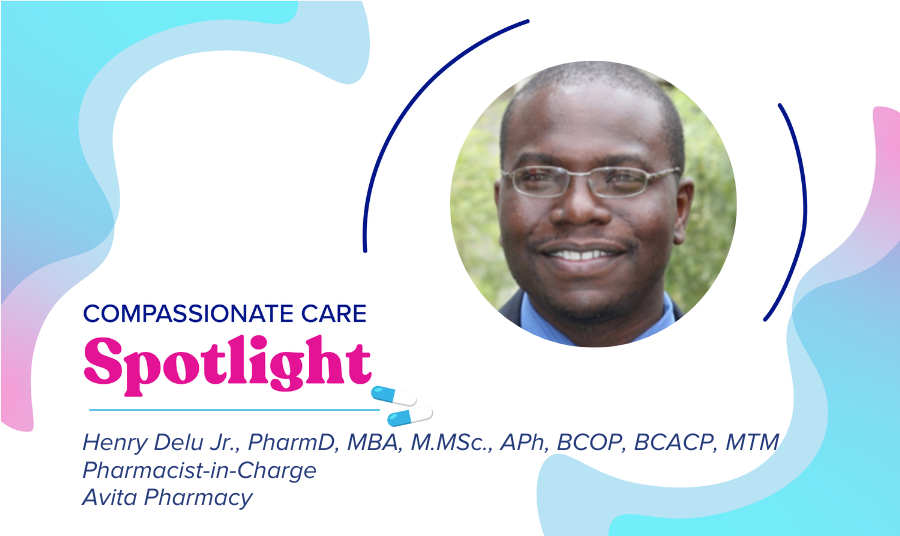Stigma. Lack of access to comprehensive care. Outdated information from providers who are behind on inclusivity and empowering their patients’ sexual wellness. There are many reasons some of the nation’s most underserved patients—including members of the LGBTQ+ community and people of color (POC)—are disproportionately impacted by sexually transmitted infections (STIs).
Fresh off presenting the findings of Q Care Plus’ novel doxycycline post-exposure prophylaxis (Doxy-PEP) intervention study at the STI Engage conference, Nurse Practitioners Tiffany Estera and Anthony Interrante spoke with The Avita Blog about how a combination of creative clinical thinking, a compassionate care mindset, and the power of telehealth are positively impacting sexual health outcomes for underserved patients across the U.S.
Avita: Q Care Plus launched its Doxy-PEP program in August of 2023 and, to date, has served more than 20,000 patients with this preventative method. Tell us about the need you saw among your patient base for Doxy-PEP, an intervention that involves taking doxycycline after sex to prevent bacterial STIs, as a conduit to sexual wellness. What were some of the barriers patients faced when trying to access care elsewhere?
Anthony Interrante, Q Care Plus nurse practitioner: The Centers for Disease Control and Prevention (CDC) data takes time to catch up, but in 2023, over 2.4 million sexually transmitted infections (STIs) were reported in the United States. While this number is slightly lower than the year prior, there is still much room for concern: Considering not everyone gets tested, the actual number of chlamydia, gonorrhea, and syphilis diagnoses out there is understated in this data.
So, STIs are a big problem, and the need for Doxy-PEP has never been greater. Prior to the CDC guidelines, Q Care Plus launched its Doxy-PEP program to promote sexual health and prevent STIs in August of 2023.
Regarding barriers to this type of prevention, many patients came to us saying their in-person provider was unwilling to prescribe them Doxy-PEP or offered only a small amount of medication at a time. Many providers had concerns regarding antimicrobial resistance and changes to the gut microbiome. Other providers were unaware of the doxy-PEP studies and efficacy to prevent STIs.
At Q Care Plus, we leverage telehealth to deliver patient-centered care to people who cannot or will not access it locally. Our providers were enthusiastic to offer access to this new intervention. When patients came to us after their in-person provider turned them down, we could offer Doxy-PEP, and the word rapidly spread about our telehealth-based sexual health services.

Anthony Interrante
MSN, MSEM, CEN, AGPCNP, AGACCNS, AAHIVS
Nurse Practitioner, Q Care Plus
We leverage telehealth to deliver patient-centered care to people who cannot or will not access it locally. When patients came to us after their in-person provider turned them down, we could offer Doxy-PEP, and the word rapidly spread about our telehealth-based sexual health services.
Avita: We know that patients living in rural areas might not have easy access to comprehensive healthcare services. We’ve also learned that many patients aren’t comfortable discussing their sexual health with primary care providers. Do you find this in your practices?
Tiffany Estera, Q Care Plus nurse practitioner: I have many patients from rural areas who don’t feel comfortable discussing their sexual healthcare needs with their hometown primary care providers (PCPs). They tell me that they feel ashamed to talk about it or even that their PCP is a friend, which I never think is a good idea.
But because Q Care Plus is telehealth-based, rural patients can easily access our care, and they feel more comfortable with our providers, who are trained to talk about sexual health.
Doxycycline has been around forever. It’s prescribed for so many things—such as malaria prophylaxis and acne treatment—where people are on it for months at a time. But suddenly, it’s being used for Doxy-PEP, and providers who typically prescribe it [for other diagnoses] are uncomfortable doing so, because now it has to do with sex. It’s all about educating people, and Q Care Plus’ marketing and outreach efforts have made a big impact.

Tiffany Estera
MSN, FNP-BC, AAHIVS
Nurse Practitioner, Q Care Plus
Doxycycline has been around forever. It's prescribed for so many things where people are on it for months at a time. But suddenly, it's being used for Doxy-PEP, and providers who typically prescribe it [for other diagnoses] are uncomfortable doing so, because now it has to do with sex.
Avita: How did the Q Care Plus team gear up for a novel, telehealth-based Doxy-PEP program? What was the most important component for success in your collective mind?
Anthony: We knew one of the factors that would make our Doxy-PEP program successful was the ability to offer it to everybody, both the insured and uninsured individuals that we care for.
Many insurance types cover Doxy-PEP 100%. Some leave a copay. Our community health partners assist in covering the copay of this medication or the entire cost of the prescription for uninsured patients.
Avita: Let’s talk about the results from a demographic standpoint: You had quite a bit of racial diversity in your patient base. Hispanic cis male patients were particularly high adopters of Doxy-PEP. Can you speak to the socioeconomic factors that influenced this?
Anthony: Patients who are people of color are disproportionately more affected by STIs than their white counterparts. This is mainly due to the barriers to healthcare that POC individuals face, including socioeconomic factors. I attribute our success in reaching a wider demographic to using educational materials in Spanish and ensuring that the campaign featured models who were POC.
There is also a built-in sense of inclusivity at Q Care Plus. The barrier to accessing your healthcare provider is essentially none. You can reach us at any time; no appointment is necessary, and we will respond to you within 24 hours. It made the process significantly easier for patients who were otherwise disenfranchised by the healthcare system.

Anthony Interrante
MSN, MSEM, CEN, AGPCNP, AGACCNS, AAHIVS
Nurse Practitioner, Q Care Plus
There is a built-in sense of inclusivity at Q Care Plus. The barrier to accessing your healthcare provider is essentially none. It made the process significantly easier for patients who were otherwise disenfranchised by the healthcare system.
Avita: Cis women were originally not included in the CDC guidelines for Doxy-PEP. How has that impacted your results?
Tiffany: Unfortunately, cis women are often not included in this type of research. However, there was one Japanese study of cis women using Doxy-PEP that showed good outcomes with daily Doxy-PEP. That’s important because it shows that although cis women aren’t included in the CDC’s Doxy-PEP guidelines, the treatment can be effective for them as well and should be included in future studies.
We prescribe Doxy-PEP to people we think would benefit from it. If you’re a cisgender female or transgender male and we agree you’re a good candidate, we’ll discuss it with you further to come up with a plan together.

Tiffany Estera
MSN, FNP-BC, AAHIVS
Nurse Practitioner, Q Care Plus
We prescribe Doxy-PEP to people we think would benefit from it. If you’re a cisgender female or transgender male and we agree you’re a good candidate, we’ll discuss it with you further to come up with a plan together.
Avita: Have any of the trends that have come out of your patient data surprised you? For example, the study found that people taking Doxy-PEP were more likely to adopt and adhere to the HIV prevention treatment pre-exposure prophylaxis (PrEP).
Tiffany: I actually wasn’t surprised by that data. I expected there to be a correlation between Doxy-PEP and PrEP adoption. Patients often come in asking for Doxy-PEP. Then we have the conversation with them: “If you’re concerned about catching other STIs, you should be concerned about HIV.” We’re usually able to get them to understand the benefits of PrEP and want it as well as Doxy-PEP.
It is exciting to see the significant impact Doxy-PEP has had on our patient base. A lot of our patients receiving HIV treatment came to us because their original provider would not prescribe them Doxy-PEP. They’ve switched over to us and have ended up being so much happier.
Anthony: I agree, the data was not surprising to me. The large majority of our patient base is gay men. Just like during the HIV crisis, when this population is faced with a health problem, we mobilize. When an intervention like Doxy-PEP becomes available and it’s something we can take to promote our health and prevent infection, we will get on board.

Avita: Let’s discuss the lessons the Q Care Plus clinical team has learned so far about overcoming health access barriers and enhancing the patient experience. I’m sure there have been many aha moments as the program has matured.
Anthony: We had to educate our patients about the difference between Doxy-PEP for STI prevention and PrEP for HIV prevention; individuals were confused that it might be a combination pill. So, there was a lot of education on how to take the two separate medications. At the time, we only offered Doxy-PEP to patients enrolled in our PrEP services or HIV+ care services.
Tiffany: Right, it can be so confusing for patients. I educate them at every visit. If they originally came to us for PrEP, I’ll say, “You came to us for PrEP, the once-daily pill that’s taken to prevent HIV. And as you likely know, it only protects you from HIV. There’s something else, Doxy-PEP, which can be taken to prevent STIs. But you take Doxy-PEP in addition to PrEP, not in place of it.” I always emphasize that patients must take the PrEP pill daily to protect themselves against HIV, while Doxy-PEP is there to prevent bacterial STIs after a sexual encounter. I say this about three times during our appointment, and sometimes my patient is like, “Okay, I got it, I got it!”
Anthony: The importance of testing was another lesson learned. Many patients don’t understand that you can get STIs like gonorrhea and chlamydia in various spots—the throat, the rectum, the vagina, and the urethra. They thought that by testing just one site, they would know if they were negative or positive for an STI. We emphasize that you must test all sites where you can potentially get the infection, because if you’re not testing there, you’re not finding the infection.

Tiffany Estera
MSN, FNP-BC, AAHIVS
Nurse Practitioner, Q Care Plus
I always emphasize that patients must take the PrEP pill daily to protect themselves against HIV, while Doxy-PEP is there to prevent bacterial STIs after a sexual encounter. I say this about three times during our appointment, and sometimes my patient is like, “Okay, I got it, I got it!”
To learn more about how Q Care Plus’ community-focused telehealth solution compassionately removes health barriers for underserved patients through stigma-free HIV prevention (PrEP) and sexual wellness care, visit qcareplus.com.




